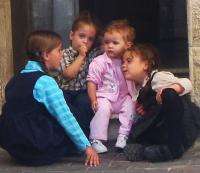Mothers see their youngest as shorter than they are

Many parents say when their second child is born that their first child suddenly appears to have grown overnight. Now, researchers reporting in the Cell Press journal Current Biology on December 16 have an explanation: until the birth of the new child, those parents were subject to a "baby illusion," routinely misperceiving their youngest child as smaller (and younger) than he or she really was.
"Contrary to what many may think, this isn't happening just because the older child just looks so big compared to a baby," says Jordy Kaufman of Swinburne University of Technology in Australia. "It actually happens because all along the parents were under an illusion that their first child was smaller than he or she really was. When the new baby is born, the spell is broken and parents now see their older child as he or she really is."
Kaufman and his colleagues made the discovery first by asking 747 mothers if they remembered experiencing a sudden shift in their first child's size after the birth of a new infant. The researchers found that 70% of the mothers did.
To further explore that perceptual shift, the researchers asked mothers to estimate the height of one of their young children (aged 2 to 6) by marking a blank wall. When the researchers compared those height estimations to the child's real height, they found something very interesting: mothers significantly underestimated the height of their youngest child by 7.5 cm on average. In contrast, height estimates for the eldest child were almost accurate.
"The key implication is that we may treat our youngest children as if they are actually younger than they really are," Kaufman says. "In other words, our research potentially explains why the 'baby of the family' never outgrows that label. To the parents, the baby of the family may always be 'the baby.'"
The findings are a useful reminder of just how filtered our own perceptions of the world around us can be.
"We cannot trust the accuracy of our perceptions," Kaufman says. "In this case, it shows that our feelings and knowledge of our children affect how we actually perceive them. But it's important to consider that this misperception may actually make it easier to quickly distinguish one's youngest child from the other children."
More information: Current Biology, Kaufman et al.: "Parental misperception of youngest child size"
















